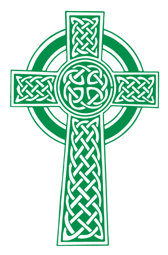The story of these missionaries and their work underlies Thomas Cahill's book How the Irish Saved Civilization, a classic in its field.
From Aleteia
By Daniel Esparza
These missions played a crucial role in preserving and transmitting knowledge during long, often complex periods in European history.The Hiberno-Scottish missions, also known as the Celtic Christian missions, were an outstanding series of religious endeavors that took place during the early medieval period –mainly from the 6th to the 8th centuries. These missions played a pivotal role in spreading Christianity (or, more precisely, Christian Celtic monasticism) across the British Isles – but also throughout some parts of continental Europe, particularly in Germany. In fact, Schottenklöster (German for “Scottish monasteries”) is the name applied to the many Bible schools established by Gaelic missionaries in Continental Europe (from which universities eventually were born), and especially to those in Germany that soon became well-known Benedictine monasteries. Indeed, some of these Schottenklösterare still active today – and yes, some of them do brew great beer.
Four prominent figures associated with these missions were Columba, Dunod, Aidan, and Columbanus, each of them making their rather unique contributions to these missions, and hence to Christianity as a whole.
St. Columba, also known as Colum Cille, was an Irish monk and abbot who founded the famous monastery on the island of Iona, off the west coast of Scotland – one of the oldest Christian religious centers in all of Western Europe. Columba’s mission centered on converting the Picts – the native peoples who then lived in what is now modern Scotland. He played a crucial role in establishing Iona as a center of Christian learning and religious influence in the region, not by engaging in explicitly missionary activities, but by setting a compelling example for others to follow. Iona’s Official Guide claims that “the prime purpose of the monastery was to create a perfect monastery as an image of the heavenly city of Jerusalem.”
Dunod, also known as St. Donatus, was an early Welsh missionary – although he was originally a North British chieftain. Being the first abbot of Bangor Iscoed, he eventually ventured to Brittany, in France, where he worked to Christianize the local population. He is best known for being the only Welsh ecclesiastic mentioned by name in Venerable Bede’s Ecclesiastical History of the English People.
St. Aidan played a significant role in the conversion of the Anglo-Saxons in Northumbria. Being Irish like Columba, he was a monk in Iona before establishing the monastery of Lindisfarne, on the famed Holy Island. Lindisfarne soon became a hub for religious and educational activities. Aidan’s approach was characterized by humility and simplicity, making him a revered figure in Christian history.
St. Columbanus (also known as Columban, and oftentimes confused with Columba himself) was an Irish monk who entered Bangor Abbey (the one where Dunod served as first abbot) and who was eventually sent to the French Burgundy as a missionary. Once in continental Europe, he established several monastic communities in France and Italy, with a strong emphasis on asceticism and monastic discipline. In fact, Columbanus’ missions in Europe contributed to the revitalization of monasticism on the continent during the early Middle Ages.
The Hiberno-Scottish missions were notable for their distinctive form of monasticism, which boosted in the continent a strong intellectual tradition. These missions played a crucial role in preserving and transmitting knowledge during long, often complex historical periods in European history, as they maintained scriptoria for copying manuscripts and established centers of learning.

No comments:
Post a Comment
Comments are subject to deletion if they are not germane. I have no problem with a bit of colourful language, but blasphemy or depraved profanity will not be allowed. Attacks on the Catholic Faith will not be tolerated. Comments will be deleted that are republican (Yanks! Note the lower case 'r'!), attacks on the legitimacy of Pope Leo XIV as the Vicar of Christ, the legitimacy of the House of Windsor or of the claims of the Elder Line of the House of France, or attacks on the legitimacy of any of the currently ruling Houses of Europe.